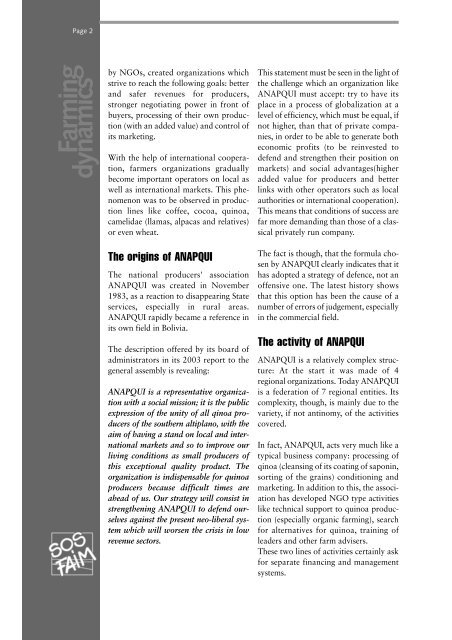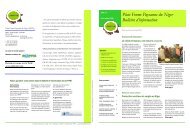ANAPQUI, a producer's experience with quinoa - SOS Faim
ANAPQUI, a producer's experience with quinoa - SOS Faim
ANAPQUI, a producer's experience with quinoa - SOS Faim
Create successful ePaper yourself
Turn your PDF publications into a flip-book with our unique Google optimized e-Paper software.
Page 2<br />
Farming<br />
dynamıcs<br />
by NGOs, created organizations which<br />
strive to reach the following goals: better<br />
and safer revenues for producers,<br />
stronger negotiating power in front of<br />
buyers, processing of their own production<br />
(<strong>with</strong> an added value) and control of<br />
its marketing.<br />
With the help of international cooperation,<br />
farmers organizations gradually<br />
become important operators on local as<br />
well as international markets. This phenomenon<br />
was to be observed in production<br />
lines like coffee, cocoa, <strong>quinoa</strong>,<br />
camelidae (llamas, alpacas and relatives)<br />
or even wheat.<br />
The origins of <strong>ANAPQUI</strong><br />
The national producers' association<br />
<strong>ANAPQUI</strong> was created in November<br />
1983, as a reaction to disappearing State<br />
services, especially in rural areas.<br />
<strong>ANAPQUI</strong> rapidly became a reference in<br />
its own field in Bolivia.<br />
The description offered by its board of<br />
administrators in its 2003 report to the<br />
general assembly is revealing:<br />
<strong>ANAPQUI</strong> is a representative organization<br />
<strong>with</strong> a social mission; it is the public<br />
expression of the unity of all qinoa producers<br />
of the southern altiplano, <strong>with</strong> the<br />
aim of having a stand on local and international<br />
markets and so to improve our<br />
living conditions as small producers of<br />
this exceptional quality product. The<br />
organization is indispensable for <strong>quinoa</strong><br />
producers because difficult times are<br />
ahead of us. Our strategy will consist in<br />
strengthening <strong>ANAPQUI</strong> to defend ourselves<br />
against the present neo-liberal system<br />
which will worsen the crisis in low<br />
revenue sectors.<br />
This statement must be seen in the light of<br />
the challenge which an organization like<br />
<strong>ANAPQUI</strong> must accept: try to have its<br />
place in a process of globalization at a<br />
level of efficiency, which must be equal, if<br />
not higher, than that of private companies,<br />
in order to be able to generate both<br />
economic profits (to be reinvested to<br />
defend and strengthen their position on<br />
markets) and social advantages(higher<br />
added value for producers and better<br />
links <strong>with</strong> other operators such as local<br />
authorities or international cooperation).<br />
This means that conditions of success are<br />
far more demanding than those of a classical<br />
privately run company.<br />
The fact is though, that the formula chosen<br />
by <strong>ANAPQUI</strong> clearly indicates that it<br />
has adopted a strategy of defence, not an<br />
offensive one. The latest history shows<br />
that this option has been the cause of a<br />
number of errors of judgement, especially<br />
in the commercial field.<br />
The activity of <strong>ANAPQUI</strong><br />
<strong>ANAPQUI</strong> is a relatively complex structure:<br />
At the start it was made of 4<br />
regional organizations. Today <strong>ANAPQUI</strong><br />
is a federation of 7 regional entities. Its<br />
complexity, though, is mainly due to the<br />
variety, if not antinomy, of the activities<br />
covered.<br />
In fact, <strong>ANAPQUI</strong>, acts very much like a<br />
typical business company: processing of<br />
qinoa (cleansing of its coating of saponin,<br />
sorting of the grains) conditioning and<br />
marketing. In addition to this, the association<br />
has developed NGO type activities<br />
like technical support to <strong>quinoa</strong> production<br />
(especially organic farming), search<br />
for alternatives for <strong>quinoa</strong>, training of<br />
leaders and other farm advisers.<br />
These two lines of activities certainly ask<br />
for separate financing and management<br />
systems.



